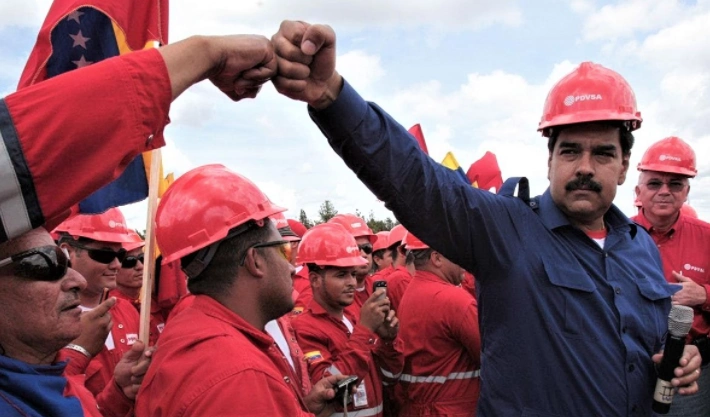At the end of a long cycle of the dictatorship of Juan Vicente Gómez, who held power in Venezuela between 1908 and 1935, the year when he died, a young Venezuelan intellectual coined the idea, or phrase, that the country should “sow oil”. This became a sort of mantra that was highlighted from time to time, and until Venezuela became an oil power, along with the debate about the need to invest that substantial income in other areas of economic life to guarantee a national development that was not dependent on crude oil.
That young intellectual was Arturo Uslar Pietri, one of the most relevant figures in the Venezuela of the 20th century and who, in 1936, wrote for the first time about the idea of sowing. To date, this South American country is the crude image of a nation that could be cataloged as post-oil, without having effectively made an industrial or agricultural leap.
At the end of 2021, the most comprehensive study on poverty in the country, carried out for several years by the Universidad Católica Andrés Bello, showed that poverty stood at 94.5% and extreme poverty reached 76.6%. That is a description of a devastated country, without the occurrence of a war or a large-scale natural disaster.
As in any crisis, there are multiple variables that intervened in Venezuela to reach this point. Due to the historical dependence of the Venezuelan economy on oil, a central aspect of this generalized crisis can be explained by the debacle of the state-owned oil company Petróleos de Venezuela (PDVSA).
The official discourse of the government of Nicolás Maduro insists on blaming the catastrophic situation of the local oil industry on the U.S. sanctions. However, there are a series of decisions that preceded Maduro’s arrival to power, which took place while Hugo Chávez was in power and which, in my opinion, explain the current disaster. The current President had the responsibility of not reverting what Chavismo decided at the time when Chávez was in power.
After overcoming a strike in the oil industry that was stoked by opposition leaders in 2003, President Chavez dismissed 18,000 PDVSA workers in a single administrative act, ranging from top managers, administrative employees and oil engineers, to well-trained workers. According to the thesis put forward by the then government, the layoffs of all those workers were because of their involvement “in activities of sabotage and treason to the homeland”.
In 2007, the then all-powerful president of PDVSA, Rafael Ramírez, called for an ideological purge within the industry, requesting “the traitors who sabotaged the operations” to be exposed. This was sealed with the phrase “PDVSA is red, red from top to bottom”, or “PDVSA es roja, rojita” in the actual speech in Spanish, referring to the emblematic color of the United Socialist Party of Venezuela (PSUV).
A year later, Chávez and Ramírez announced, with great fanfare, that PDVSA would be engaged in importing and distributing food within the framework of what the government called “the economic war”. The massive wave of land and factories nationalization, together with exchange-rate controls that had already lasted for five years, placed the historically weak national oil production in a critical situation.
All this happened long before the sanctions. In terms of human capital, the company was abruptly decapitalized and, in terms of the labor climate, whistleblowing tactics were imposed. Moreover, much-needed resources and efforts were devoted to a completely unrelated area, such as the food industry. These are some of the keys to understanding the cruel paradox that is currently affecting Venezuelans.
Standing on a territory that has the largest oil reserves in the world, over 300 billion barrels, and one of the largest natural-gas reserves, some 200 billion cubic feet, Venezuelans still suffer recurrent failures in the distribution of gasoline and a chronic absence of domestic gas. According to La Gente Propone, a citizen observatory, it can take up to six months in some municipalities to obtain a cylinder of gas for cooking.
January 2022 marked three years since the establishment of U.S. sanctions against PDVSA. And after a year and a half of the worst moment of crude oil production, Chavismo has managed to return to the levels prior to Washington’s restrictions, thanks to a synergy with Iran and rising exports to China.
In January, in an interview granted to journalist Ignacio Ramonet and broadcasted by the Venezuelan government television, Maduro stated that—again, after the impact of U.S. sanctions—one million barrels of oil per day had been reached.
The figure, which represents about a third of Venezuelan oil production before Chavez came to power in 1999, represents, nevertheless, an economic and symbolic victory for the Maduro regime. The worst seems to be over for the Venezuelan ruler, at least in terms of international pressure and the application of sanctions by the United States.
Francisco Monaldi, director of the Latin American energy program at Rice University in Houston, said that, although he doubts the one-million-barrels-per-day figure, he recognizes that Chavismo managed to reverse the negative impact of the sanctions in 2021.
Gone is June 2020, the worst moment for oil production and exports in Venezuela, when the trade siege imposed in January 2019 by Donald Trump’s administration worsened. A year and a half ago, the then U.S. president succeeded —after direct pressure— in getting Russia’s Rosneft to stop transporting and trading Venezuelan crude oil and derivatives. According to PDVSA figures, production was just 392 thousand barrels per day in June 2020, a figure that brought the nation to its production levels eight decades ago.
The abrupt fall in 2020 in oil output wasn’t due to a decrease in production potential or production capacity, but due to the inability to sell hydrocarbons at already low prices and to evade sanctions. Production bounced back because prices rose significantly and PDVSA was able, with the help of Iran, to evade sanctions by substituting Rosneft. In addition, Iran began to supply the diluents that the Russians used to bring to market, Monaldi explained.
High prices, and an undeclared policy of easing sanctions by the United States’ government, have allowed Chavismo to market its oil a little more comfortably. “Almost all Venezuelan oil ends up on the dark roads in China, at a discount, while a small portion goes to Cuba.” In essence, there was no increase in output potential at the end of 2021, but rather the regime recovered the production that had to be shut because they couldn’t sell it”, says Monaldi.
Rafael Quiroz, an economist specialized in the oil industry and professor at the Universidad Central de Venezuela, said that 800 thousand barrels per day were produced last December, which is short of one-million barrels announced by Maduro. Likewise, Iran has also played a role in achieving the normalization of gasoline supply after long months of intermittent shortages in several regions, especially outside Caracas and the country’s large cities.
Since mid-2020, no new wells have been drilled because there aren’t drilling rigs operating, experts said. Therefore, it is hard to believe that there’s a production increase above one million barrels per day as the Maduro government maintains. In Quiroz’s opinion, the recovery of the Venezuelan oil industry requires investments in the order of $40 billion to $50 billion, with an injection of resources that are sustainable over time. This seems unfeasible under the current economic and political scheme in Venezuela.
At the end of 2021, the firm Sustainalytics, which analyzes the energy sector globally, ranked PDVSA as the worst-positioned company among 253 oil and gas producers due to its lack of environmental, social and governance strategy.
It is a stark contrast when compared to the recent past. In the late 1990’s, before Chavez came to power in February 1999, PDVSA ranked as the fourth-largest oil producer in the world, according to the American Petroleum Institute’s ranking. Venezuela hasn’t only been unable to sow oil and diversify its economy. It hasn’t been able to sustain its condition as an oil-producing country.
Translated from Spanish by Ricardo Aceves













